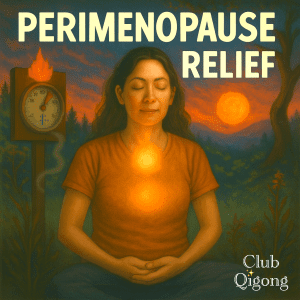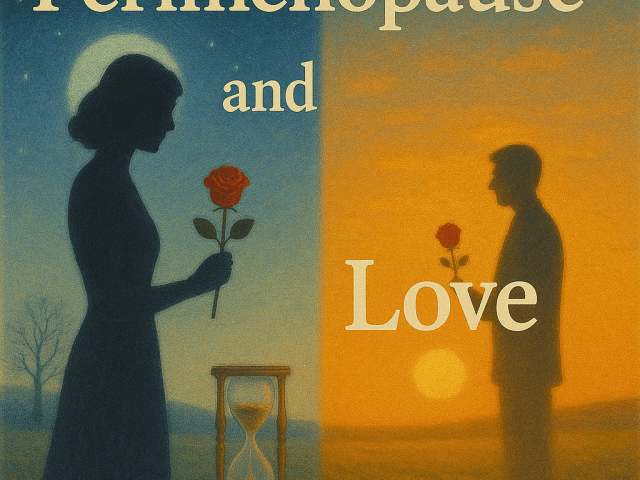
Is it Perimenopause, Hypothyroidism, or Both?
Perimenopause and hypothyroidism are often mistaken for each other, overlap wildly, and sometimes even trigger one another. That means if you’re going through perimenopause and things feel extra off — physically, mentally, emotionally — your thyroid might be silently screaming in the background.
Let’s break it down:
🔁 Shared Symptoms:
Both perimenopause and hypothyroidism can cause:
-
Fatigue and brain fog
-
Weight gain (especially around the belly)
-
Depression or mood swings
-
Irregular periods
-
Cold sensitivity or hot flashes
-
Dry skin, thinning hair
-
Low libido
So you might think it’s “just hormones” from perimenopause, or chalk it up to aging, stress, or burnout — when in reality, your thyroid could be underactive and making everything worse.
🧠 Emotional & Relationship Impact:
Now, stack hypothyroidism on top of perimenopause…
That’s not just moodiness — that’s emotional burnout. The kind that affects how you see your partner, your self-worth, your drive, your ability to function.
So when Melissa and I were drifting, what we didn’t realize is that all these physical and emotional symptoms weren’t just “a rough patch.” They were red flags. Signals. And undiagnosed hypothyroidism could’ve made everything look and feel more hopeless than it really was.
📍 The Connection:
-
Perimenopause can trigger thyroid issues, especially in women who are genetically prone or already borderline.
-
Estrogen fluctuations during perimenopause affect how your body uses thyroid hormones.
-
Many women get diagnosed with hypothyroidism in their 40s and early 50s, but they’ve been symptomatic for years before that.
💡 Moral of the Story:
If your relationship feels like it’s unraveling and you or your partner feel unlike yourself — tired, irritable, foggy, disconnected — it might not be your marriage.
It might be your thyroid.
Before you call the lawyer, call your doctor. Get the bloodwork. The answer might be hormonal, not hopeless.
🔟 Ways to Tell If It’s Hypothyroidism or Perimenopause
1. Heat vs. Cold Sensitivity
-
Perimenopause: Hot flashes, night sweats, sudden heat surges like you swallowed a space heater.
-
Hypothyroidism: You’re always cold, even when everyone else is sweating. Socks in summer? Check.
2. Period Patterns
-
Perimenopause: Periods become irregular — skipping months, showing up early, flooding like a biblical event, then ghosting you.
-
Hypothyroidism: Periods are heavy and regular or suddenly way too light — but not usually unpredictable.
3. Mood Swings vs. Flat Mood
-
Perimenopause: Rollercoaster mood swings. Crying one second, rage-cleaning the fridge the next.
-
Hypothyroidism: Flat mood, low motivation, low-key depression that lingers like bad elevator music.
4. Weight Gain Style
-
Perimenopause: Weight gain, especially around the middle, despite your green smoothie efforts.
-
Hypothyroidism: Sluggish metabolism, full-body puffiness or bloated face, and constipation often tagging along.
5. Hair Drama
-
Perimenopause: Hair thinning, especially around the crown or temples.
-
Hypothyroidism: Hair feels dry, brittle, even loses the outer third of your eyebrows (yes, really).
6. Energy Tank
-
Perimenopause: Energy comes and goes in waves — fatigue shows up around your cycle or after poor sleep.
-
Hypothyroidism: Constant fatigue, no matter how much you rest. You feel like you’re running on low battery 24/7.
7. Sleep Issues
-
Perimenopause: Trouble falling or staying asleep, often paired with night sweats and anxiety.
-
Hypothyroidism: You could sleep 10 hours and still feel exhausted — and maybe nap again at lunch.
8. Skin Signals
-
Perimenopause: Skin might feel dry or thin, but often oily too. Hormonal acne can resurface (like a teenage ghost).
-
Hypothyroidism: Dry, rough, flaky skin, especially elbows and shins. Nails might be brittle too.
9. Libido Drop
-
Both can affect libido, but:
-
Perimenopause: Fluctuates — can dip sharply with hormone crashes.
-
Hypothyroidism: Tends to flatten overall, like someone just turned the switch off.
-
10. Labs Don’t Lie (Usually)
-
Get bloodwork.
-
For hypothyroidism: Check TSH, Free T3, Free T4, and thyroid antibodies.
-
For perimenopause: Hormone testing (FSH, estrogen, progesterone) might help — but symptoms often speak louder.
-
🌿 Qigong Insights for Hormonal Balance & Energy Rebuilding
🧘♂️ “When you move Qi, you move life. When you still the mind, you hear its wisdom.”
– Master Liu He
Whether you’re battling brain fog, hot flashes, exhaustion, or emotional swings that could knock over a bookshelf, Qigong reminds us:
✨ You are not broken — your energy is just out of balance. And balance can be restored.
🌬️ 5 Qigong Tips to Heal Hypo & Peri Naturally
1. 🌕 Practice “Kidney Qigong” for Hormonal Power
In TCM (Traditional Chinese Medicine), the Kidneys govern hormones, aging, and energy reserves. Gentle tapping of the lower back, deep abdominal breathing, and the “Kidney Sound” (“Choo”) can revitalize this energy system.
🟦 Try this: Stand with feet hip-width apart, rub your palms until warm, and place them over your lower back. Breathe deeply for 3 minutes while imagining warm light filling your core.
2. 🌸 Open the Liver Meridian to Release Emotional Buildup
The Liver holds onto anger and frustration — emotions that flare in both perimenopause and thyroid imbalance. Slow, flowing arm movements like “Smoothing the River” help clear emotional stagnation.
💚 Flow idea: Stand tall, inhale arms up wide like wings, exhale as you float them down the center like calming water.
3. 🔥 Cool the Fire with the “Heart Healing Sound”
Hot flashes, anxiety, night sweats? The Heart Fire is overactive. Exhale with a soft “Haawww” sound to release excess heat and settle the nervous system.
☀️ Evening ritual: 5 minutes of this sound before bed can calm the spirit and aid deep sleep.
4. 🐢 Practice “Standing Like a Tree” for Thyroid & Adrenal Support
Stillness is power. “Zhan Zhuang” (standing meditation) helps reset the endocrine system, build inner strength, and calm the overworked thyroid.
🌳 Stand like a tree: Knees slightly bent, arms rounded like holding a ball in front of your chest, eyes soft. Breathe deep and still for 5–10 minutes.
5. 💧 Let the Qi Flow Daily — Even 10 Minutes Counts
Consistency matters more than perfection. Short Qigong sessions done daily can regulate mood, improve energy, and support thyroid hormone flow.
📅 Tip: Pair it with tea time, sunrise, or bedtime. Ritual + rhythm = transformation.
❤️ Final Thought:
These symptoms are your body whispering — not breaking.
Qigong offers the ancient language to listen, respond, and realign. Not just to feel better… but to become whole again.
If you’re curious, stick around. Your energy is waiting for you to come back home.
🧘♀️ Ready to Reignite Your Inner Fire?
Explore Melissa’s Thyroid Healing with Qigong course to warm up your core, awaken your metabolism, and move with intention. Your thyroid may be small, but your Qi is mighty. These are tips that Melissa used to successfully heal her thyroid and life her Best Life.
Also check out our full Qigong for Beginners series for a step-by-step intro to the forms that build your inner energy and restore hormonal balance over time.




